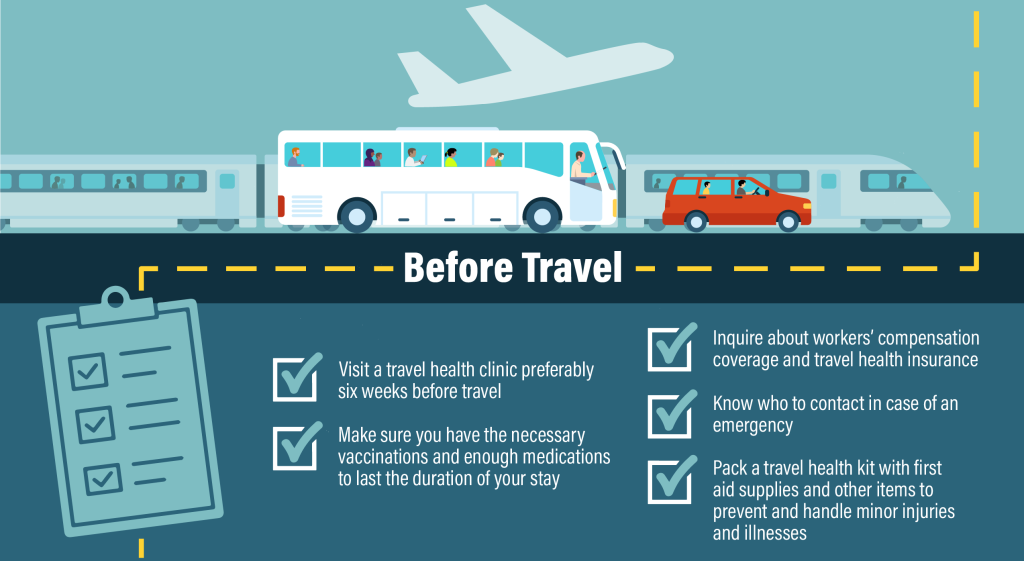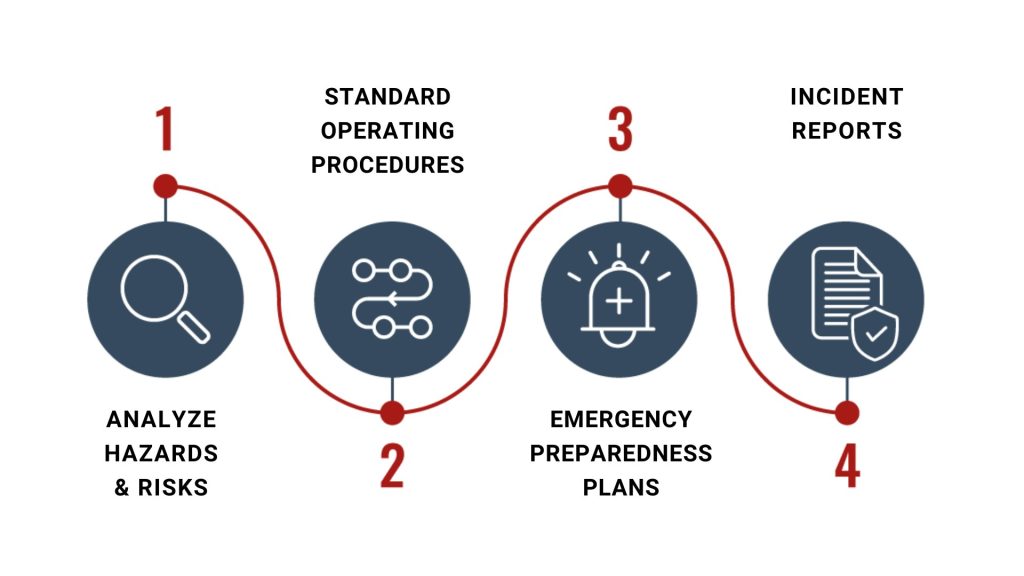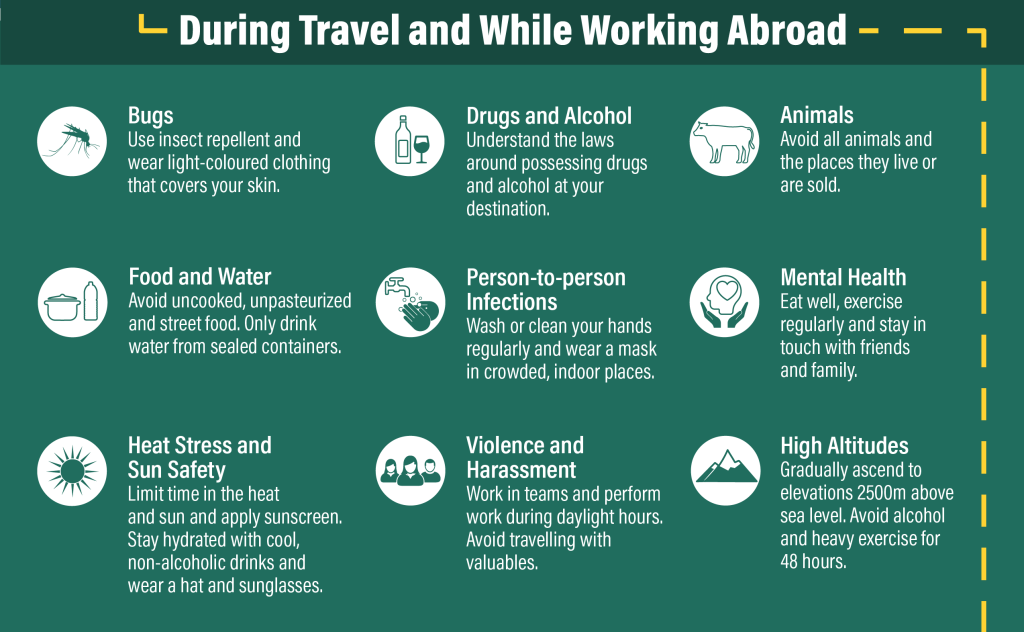It’s a wonderful world out there. And nowadays, with international travel easier and more accessible than ever, it only takes a matter of hours, or a day or so at worst, for us to zoom across the world. Whether you’re interested in setting out to explore countries, cultures, and cuisines or jetting off to meet colleagues, clients, or companies, international travel has and continues to open a world of possibilities.
However, sometimes this means risky or dangerous possibilities.
With more people traveling than ever before, we’ve seen the rise of infectious diseases like COVID-19, the impact of climate change, and the particular challenges posed by remote destinations with limited access to medical care. These developments remind us of a simple truth—when we travel, we carry our very previous but vulnerable health with us.
Travel risk management is the practice of preparing for the unknown, not out of fear, but out of care—for yourself, for your well-being, for the lives you touch.
In this blog, we hope to be your guide in understanding the many aspects of risk management for travel so you can travel smart and safely, wherever your wanderlust takes you.
What is Travel Risk Management?
Travel risk management isn’t about avoiding travel or focusing on worst-case scenarios. Instead, it’s about understanding the risks, whether physical, environmental, or mental, and creating a plan that covers everything from preventive care to real-time responses when things go wrong.
A good travel risk management plan starts well before the trip even begins, with pre-travel health checks, vaccinations, and any necessary preventive medications.
But it doesn’t stop there. During the trip, travelers need access to support—whether that means telemedicine, monitoring health in real-time, or having a clear plan for emergencies. And after the trip, there’s the follow-up care that’s so often missed. If someone picks up an illness or injury while traveling, their recovery may stretch beyond their return home.

The Key Components of Travel Risk Management
Managing travel health risks means breaking the process down into clear steps. Each of these components works together to offer a full circle of care, from preparation to follow-up.
- Identifying Risk: Before anyone boards a plane, it’s important to understand the specific health risks associated with the destination. Are there outbreaks of disease in the area? Are there environmental hazards like extreme heat or altitude that could pose a risk? What is the accessibility of healthcare facilities?
- Assessing Risk: Not all travelers are affected by the same risks in the same way. Someone with asthma, for instance, might face different challenges when traveling to an area with poor air quality. Assessing the individual’s health, needs, and vulnerabilities should be the key focus here.
- Mitigating Risk: With risks identified and assessed, the plan moves to prevention. This could be as simple as providing medication or as complex as planning an emergency evacuation route. The primary goal here is to lower the chance that something will go wrong in the first place, though also having a plan in case certain actualities can’t be fully avoided.
- Pre-Travel Preparation: This focuses on making sure travelers are equipped with everything they need before they leave. —vaccinations, medication, travel insurance, emergency contacts, and knowing where the nearest medical facilities are.
- Real-Time Response: Things can still happen despite the best-laid preparations, and for this reason, it’s most ideal to have systems in place to offer help in real time. This could be through telemedicine, concierge emergency medical services, or other forms of support.

The Role of Travel Health Risk Assessment
Let’s zoom in on, arguably, the most important step in the whole process.
Much like the conventional health risk assessment, travel health risk assessments take a clear-eyed look at the potential challenges you might face on the road. This is where travelers need to ask the real and honest questions of: What health issues are prevalent at my destination? How will my existing health conditions react to the new environment? Do I have access to the medical care I might need?
For some, especially those with chronic conditions or specific health concerns, this kind of assessment can be the difference between a smooth trip and a serious complication. It also extends beyond physical health—stress, anxiety, and other mental health challenges can be intensified when you’re in unfamiliar territory.
By assessing these risks beforehand, you give yourself the tools to stay in control, even when the unexpected happens.
Common Health Risks When Traveling Abroad
Some risks are minor, like an upset stomach. Others can be life-altering. It’s not about living in fear, but about recognizing that these risks exist and taking steps to protect yourself. Here are a few of the most common health risks travelers face—and what you can do about them.
1. Infectious diseases
Malaria, dengue fever, and other vector-borne diseases remain common in many parts of the world. Even diseases that we might consider “under control” at home, like COVID-19 or tuberculosis, do not mean we are immune.
Additionally, COVID-19 is a prime example that showed us how quickly a virus can spread, especially in crowded places like airports. But it’s not the only traveling disease out there. There are others—dengue, Zika, and cholera—depending on where you’re headed.
Vaccinations, preventative prescription medications (like in the case of malaria, for example), and staying informed about outbreaks in your destination are some of the most effective steps you can take.
2. Chronic Conditions
If you live with a chronic condition, travel brings another layer of complexity. Conditions like diabetes, asthma, or heart disease don’t take a break just because you’re on vacation or a business trip. The stress of long flights, time zone changes, and unfamiliar environments can trigger flare-ups. Access to regular medications may be limited, especially in remote areas, and emergency care might not be available.
Preparation here is key. Talk to your doctor about adjusting your treatment plan before you go,, ensuring they provide the necessary duty of care for your needs, and make sure it’s easily accessible during your travels. Know where the nearest hospital or clinic is and keep a list of local emergency numbers. Traveling with a chronic condition isn’t impossible, but it does require planning ahead.
3. Environmental risks
Foodborne Illnesses
Something as simple as eating food you’re not used to can lead to foodborne illnesses like traveler’s diarrhea, which is incredibly common. Local bacteria in food and water can be tough on a traveler’s system. When in doubt, stick to bottled water and avoid uncooked foods, especially in regions where food safety standards might not be up to par.
Altitude Sickness
Altitude sickness is another risk, especially if you’re traveling to high-altitude locations like the Andes or the Himalayas. Symptoms range from headaches and dizziness to more serious complications. Taking the time to acclimatize and staying hydrated can help, but in severe cases, descending to lower altitudes is the only remedy.
Extreme Weather
Traveling to regions with extreme heat, cold, or humidity can impact your health in ways you might not expect. Heatstroke, frostbite, and dehydration can turn a trip into a medical emergency. Dressing appropriately, staying hydrated, and taking breaks in extreme weather conditions are simple but effective ways to protect yourself.
4. Mental Health Risks
We often think of travel as an escape, but the challenges of navigating foreign environments can take a toll on mental health.
Stress, anxiety, and even depression can arise, especially when you’re far from home, dealing with unfamiliar cultures, languages, or unexpected disruptions. Being away from your support network can amplify feelings of isolation, and the pressure to keep things together might compound the problem.
Recognize the signs of stress and anxiety before they become overwhelming. Build time into your trip for rest and reflection. If you’re traveling for work, try to create a balance between productivity and self-care.
It’s also wise to know where to access mental health support in case it’s needed, whether through telehealth or local services. Don’t underestimate the emotional challenges of travel—your mental health is as important as your physical health.

Main Challenges with Travel Risk Management
Despite the importance and advancements within risk management for travel, many travelers encounter gaps in traditional insurance and healthcare systems.
Challenge #1: Global Healthcare Accessibility
When we travel, especially to distant or remote places, the healthcare systems we’re accustomed to may not be available or easy to navigate.
In some areas, medical facilities might be far away, understaffed, or simply not equipped to handle certain conditions. Language barriers can complicate things further, turning what should be straightforward care into a stressful ordeal.
Even in more developed countries, the way healthcare is structured can vary, leaving you feeling like a stranger in the very system you’re trying to rely on.
WorldClinic Solution: We offer 24/7 telemedicine support and globally accessible concierge medicine, giving you direct access to doctors who know your medical history, in addition to an expertly stocked Personal Medical Kit with prescription and over-the-counter medications tailored to your needs. We also connect you with local, vetted medical services to ensure you’re never navigating these systems alone.
Challenge #2: Lack of Customizable Health Plans
Travel insurance or standard health plans are often built for the masses, not for individuals. They rarely take into account your personal health needs or the specific risks tied to your destination.
WorldClinic Solution: We build a plan around you—your health, your concerns, your travel plans. Whether it’s addressing a chronic condition or anticipating the risks of your destination, our unique concierge medicine model makes sure you’re well and truly covered.
Challenge #3: Limited Emergency Medical Response
Traditional insurance might offer emergency medical evacuation, but these services can be slow, with travelers often needing to cover costs upfront.
WorldClinic Solution: We provide real-time emergency support and medical evacuation with an on-demand guarantee of payment, ensuring that travelers receive care without delay.
Do I Need Travel Risk Management?
The truth is, none of us can predict what we’ll face when we travel.
Health risks don’t send us a warning. One day you’re fine, and the next, you’re navigating an illness or injury in a place far from home. And relying solely on local healthcare services may not be enough, especially in remote areas where access to medical facilities is limited. Even in well-developed countries, the healthcare system may not be prepared for your specific needs or expectations.
Infectious diseases, chronic conditions, and unforeseen medical emergencies can derail any trip. The unpredictability of these risks makes it necessary to have a good plan. To this end, we say yes, it should be considered a necessity.
Conclusion
As we venture out into the world, whether for work or leisure, it’s important to remember that health is always part of the journey. Travel risk management solutions allow us to stay prepared, ensuring we have the resources we need to stay safe and well. With services like WorldClinic’s exclusive concierge medical services, travelers can rest easier knowing they have access to 24/7 care, personalized health plans, and real-time emergency support.
Stay safe, travel thoughtfully, and remember—your health is your most important companion on the road.
Frequently Asked Questions
What are the travel risk indicators?
Travel risk indicators include factors like local political stability, crime rates, weather conditions, disease outbreaks, and healthcare infrastructure. These help gauge the overall safety of a destination.
Where can I check current health risks in different destinations?
The Centers for Disease Control and Prevention (CDC) provides up-to-date health notices. You can check their website for alerts about disease outbreaks, required vaccinations, and other health risks specific to your destination here.
What is the most common travel risk?
The most common travel risks are health-related, particularly foodborne illnesses, dehydration, or infections due to poor sanitation.
How do you do a travel risk assessment?
A travel risk assessment involves understanding your destination’s political, environmental, and health landscape. This includes reviewing local risks, ensuring your vaccinations and health needs are covered, and planning how to manage potential medical emergencies.


